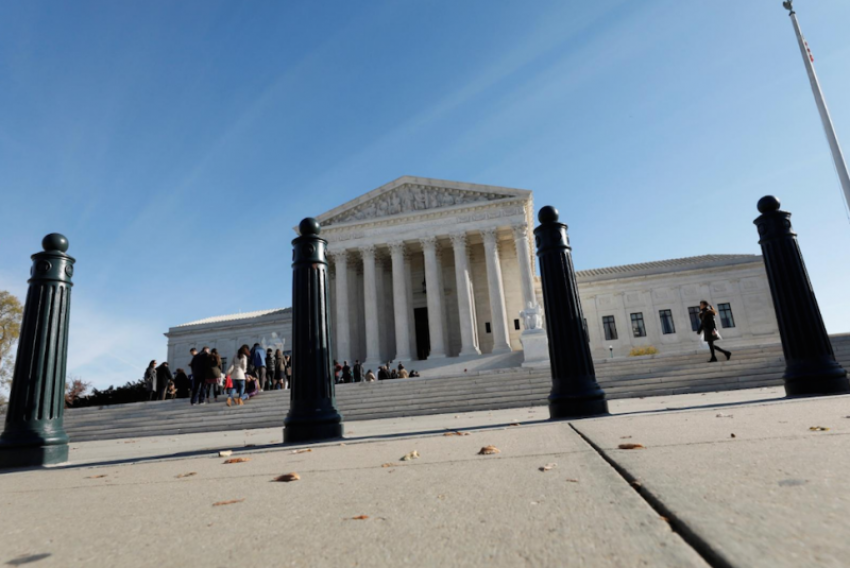Supreme Court lets ruling against charter school's skirt dress code for girls stand

The U.S. Supreme Court has refused to hear an appeal from a North Carolina charter school trying to preserve a dress code that requires girls to wear skirts, allowing an earlier ruling striking down the dress code to stand.
In an orders list released Monday morning, the high court declined to hear oral arguments in the case of Charter Day School, Inc., et al. v. Peltier, Bonnie, et al.
As a result, an earlier ruling from the U.S. 4th Court of Appeals that concluded that the school's dress code violated civil rights law will stand.
The American Civil Liberties Union, which represented the plaintiffs, celebrated the Supreme Court's refusal to hear the appeal.
"Today's announcement is a victory for the thousands of students who attend public charter schools in North Carolina and for the 3.6 million students like them nationwide," ACLU Women's Rights Project Director Ria Tabacco Mar said in a statement.
"Girls at public charter schools have the same constitutional rights as their peers at other public schools — including the freedom to wear pants. We will continue to fight for all girls to learn in safe and equal schools."
In 2016, Bonnie Peltier and other parents of girls enrolled at the Leland-based Charter Day School filed suit against the educational institution over its dress code for female students, arguing that it imposed various problems for their children.
Baker Mitchell, the school's founder, defended the skirts policy, telling the Associated Press in a 2021 interview that it was part of the traditional environment they wanted to advance.
"We're a school of choice. We're classical in our curriculum and very traditional. I believe that the more of the traditional things you have in place, the more they tend to reinforce each other," said Mitchell.
"We want boys to be boys and girls to be girls and have mutual respect for each other. We want boys to carry the umbrella for girls and open doors for them ... and we want to start teaching that in grammar school."
In 2019, a federal judge ruled that the dress code violated the Equal Protection Clause of the 14th Amendment because the charter school was considered a public academic institution.
A three-judge panel of the 4th Circuit vacated the lower court ruling in a 2-1 decision published in August 2021, with the majority deciding that the school was not a public entity.
The panel majority sent the case back to the lower court for consideration over whether the dress code violated federal Title IX civil rights law, which prohibits discrimination on the basis of sex.
In June 2022, the full court of the 4th Circuit ruled against the dress code. Senior Circuit Judge Barbara Milano Keenan, an Obama appointee, authored the majority opinion, which concluded in part that the school was a "state actor" and must be held accountable to antidiscrimination law.
"CDS does not attempt to disguise the true, and improper, rationale behind its differential treatment of girls, which plainly does not serve an important governmental interest," wrote Keenan, labeling the school standards as being based on "impermissible gender stereotypes."
"CDS has imposed the skirts requirement with the express purpose of telegraphing to children that girls are 'fragile,' require protection by boys, and warrant different treatment than male students, stereotypes with potentially devastating consequences for young girls. If CDS wishes to continue engaging in this discriminatory practice, CDS must do so as a private school without the sanction of the state or this Court."
Circuit Judge A. Marvin Quattlebaum, Jr., a Trump appointee, authored a dissent, arguing that the school should have been considered a private entity and not subject to civil rights law.
"In my view, in deciding that a private operator of a North Carolina charter school is a state actor, the majority misconstrues and ignores guidance from the Supreme Court and all of our sister circuits that have addressed either the same or very similar issues," wrote Quattlebaum.
"My worry is that the majority's reasoning transforms all charter schools in North Carolina, and likely all charter schools in the other states that form our circuit, into state actors. As a result, the innovative alternatives to traditional public education envisioned by North Carolina when it passed the Charter Schools Act, and thus the choices available to parents, will be limited."



























